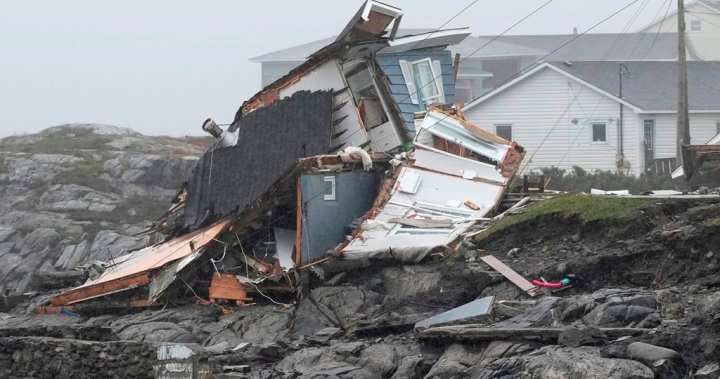
Climate changed: Fiona demonstrated wild hurricane future, and need to adapt
Global News
Political leaders are asked how they'll prepare the coastlines and power grids to meet the next gale after post-tropical storm Fiona blew through the region.
As she stood near the remnants of flattened homes in Port aux Basques, N.L., Denise Anderson said the thought of continuing to live next to the ocean is hard after a deadly storm foreshadowed the violence of weather to come.
“I grew up in this area, I wanted to come back to this area, but now I’m not so sure I want to,” she said two days after post-tropical storm Fiona damaged the home where she has lived for three years, destroyed her neighbours’ houses and swept one local woman out to sea.
Across the East Coast, similar emotions about the way climate change is altering life can be heard, as residents rebuild their homes and cope with weeks without power, and political leaders are asked how they’ll prepare the coastlines and power grids to meet the next gale.
About 200 kilometres to the south across the Cabot Strait, in Reserve Mines, N.S., Reggie Boutilier pointed out a missing portion of his roof and wondered when the next storm would come. “It’s only early in the hurricane season, and I’m thinking we’re off to a bad start,” he said the day after Fiona hit.
The scientific predictions on what’s to come aren’t reassuring.
Canada’s Changing Climate, a federal summary of climate science released in 2019, said fossil fuel emissions are likely increasing the intensity of tropical storms that form in the southern Atlantic and head north to the Canadian coast
Blair Greenan, a federal scientist at the Bedford Institute of Oceanography who worked on the report, said in an interview that water temperatures off the Maritimes have gone up 1.5 C over the past century, adding a potent source of increased energy for the storms.
Anya Waite, a professor of oceanography at Dalhousie University, said the “sobering” reality is the warmer water shoots heat and moisture into storms like Fiona, giving them a longer duration and, often, a wider path.











